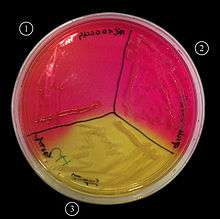Mannitol salt agar

Mannitol salt agar or MSA is a commonly used selective and differential growth medium in microbiology. It encourages the growth of a group of certain bacteria while inhibiting the growth of others. This medium is important in medical laboratories by distinguishing pathogenic microbes in a short period of time.[1] It contains a high concentration (about 7.5%-10%) of salt (NaCl), making it selective for Gram-positive bacteria (Staphylococcus and Micrococcaceae) since this level of salt is inhibitory to most other bacteria.[2] It is also a differential medium for mannitol-fermenting staphylococci, containing carbohydrate mannitol and the indicator phenol red, a pH indicator for detecting acid produced by mannitol-fermenting staphylococci. [3] Staphylococcus aureus produces yellow colonies with yellow zones, whereas other coagulase-negative staphylococci produce small pink or red colonies with no colour change to the medium.[4] If an organism can ferment mannitol, an acidic byproduct is formed that causes the phenol red in the agar to turn yellow.[1] It is used for the selective isolation of presumptive pathogenic (pp) Staphylococcus species.
Expected results
- Gram + Staphylococcus: fermenting mannitol: medium turns yellow (e.g. S. aureus)
- Gram + Staphylococcus: not fermenting mannitol, medium does not change color (e.g. S. epidermidis)
- Gram + Streptococcus: inhibited growth
- Gram -: inhibited growth [1]
Typical composition
MSA typically contains:[5]
- 5.0 g/L enzymatic digest of casein
- 5.0 g/L enzymatic digest of animal tissue
- 1.0 g/L beef extract
- 10.0 g/L D-mannitol
- 75.0 g/L sodium chloride
- 0.025 g/L phenol red
- 15.0 g/L agar
- pH 7.4 ± 0.2 at 25°C
References
- 1 2 3 Bachoon, Dave S.; Dustman, Wendy A. (2008). "Exercise 8: Selective and Differential Media for Isolation". In Michael Stranz. Microbiology Laboratory Manual. Mason, OH: Cengage Learning.
- ↑ "Mannitol salt agar" (PDF). Becton, Dickinson and Company. 2005.
- ↑ Anderson, Cindy (2013). Great Adventures in the Microbiology Laboratory. Pearson. pp. 175–176. ISBN 978-1-269-39068-2.
- ↑ "Mannitol salt agar (7143)" (PDF). Neogen Corp. 2008.
- ↑ The United States Pharmacopeia (23rd ed.). Rockville, MD: The United States Pharmacopeial Convention. 1995.